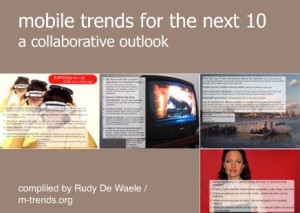 Rudy De Waele (@mtrends), who has been tracking the mobile space for as long as I can remember, asked a number of his personal “mobile heroes” to predict five game-changing mobile trends for the next decade. Not quite sure how I made the list – there are some real heavyweights included (see below) – but I’m flattered none-the-less. Here are my 5 mobile trends for the next ten years.
Rudy De Waele (@mtrends), who has been tracking the mobile space for as long as I can remember, asked a number of his personal “mobile heroes” to predict five game-changing mobile trends for the next decade. Not quite sure how I made the list – there are some real heavyweights included (see below) – but I’m flattered none-the-less. Here are my 5 mobile trends for the next ten years.
As phones get smarter, pipes get dumber
In the era of app stores and handset makers launching their own Software-as-a-Service (SaaS) offerings, mobile carriers will continue to struggle with the issue of who ‘owns’ the customer. Terrified of becoming a dumb pipe reduced to selling commodity voice and data services, some will try to innovate with their own SaaS products, most of which will fail, while the smartest players will partner and invest in innovative startups. That said, as the pipes get increasingly clogged up carrying all of this data, and with the advent of 4G, networks will start to focus on and highlight their competitiveness based on infrastructure and capacity alone.
Your phone will become your doctor
Mobile phones are already the ubiquitous mobile device and, increasingly, provide a ubiquitous Internet connection. Just like the best camera is the one that you have with you, more and more hardware functionality, such as innovative input devices and sensors, combined with software and a data connection will piggyback the mobile phone, rather than try to compete as a separate device. Health care will be a major benefactor.
Money transfer beyond mobile banking
The mobile phone will replace your wallet. Not only will you be able to manage your money via your mobile phone and use it to pay for products in authorized retail outlets both online and offline, but mobile money transfer will extend to peer-to-peer. Everyone will become a walking ‘cash’ register.
Battery technology will finally catch up
The combination of new types of battery technology and less power hungry chips will lead to mobile phones, even under the strain of all of this new hardware, software and data functionality, being able to stay powered up for more than a day. Perhaps days. Evidenced by the recent Netbook phenomenon, with 7+ hours becoming the norm for a low cost 10inch laptop.
People will share more and more personal information
Both explicit e.g. photo and video uploads or status updates, and implicit data. Location sharing via GPS (in the background) is one current example of implicit information that can be shared, but others include various sensory data captured automatically via the mobile phone e.g. weather, traffic and air quality conditions, health and fitness-related data, spending habits etc. Some of this information will be shared privately and one-to-one, some anonymously and in aggregate, and some increasingly made public or shared with a user’s wider social graph. Companies will provide incentives, both at the service level or financially, in exchange for users sharing various personal data.
See the full presentation
Other contributions come from Howard Rheingold, Douglas Rushkoff, Marshall Kirkpatrick, Gerd Leonhard, Timo Arnall, Carlo Longino, Katrin Verclas, Atau Tanaka, Alan Moore, Marek Pawloski, Ajit Jaokar, Nicolas Nova, Inma Martinez, Tony Fish, Jonathan MacDonald, Willem Boijens, Carlos Domingo, Russ McGuire, Raimo van der Klein, Michael Breidenbruecker, Robert Rice, Ted Morgan, Martin Duval, Andreas Constantinou, Fabien Girardin, Matthäus Krzykowski, Rich Wong, Andy Abramson, Ilja Laurs, David Wood, Stefan Constantinescu, Henri Moissinac, Kevin C. Tofel, Enrique C. Ortiz, Felix Petersen, Tom Hume.

it is amazes me that little thing such a cell phone can provide such a service…right now i have i phone and believe me that it work really hard…:)
great